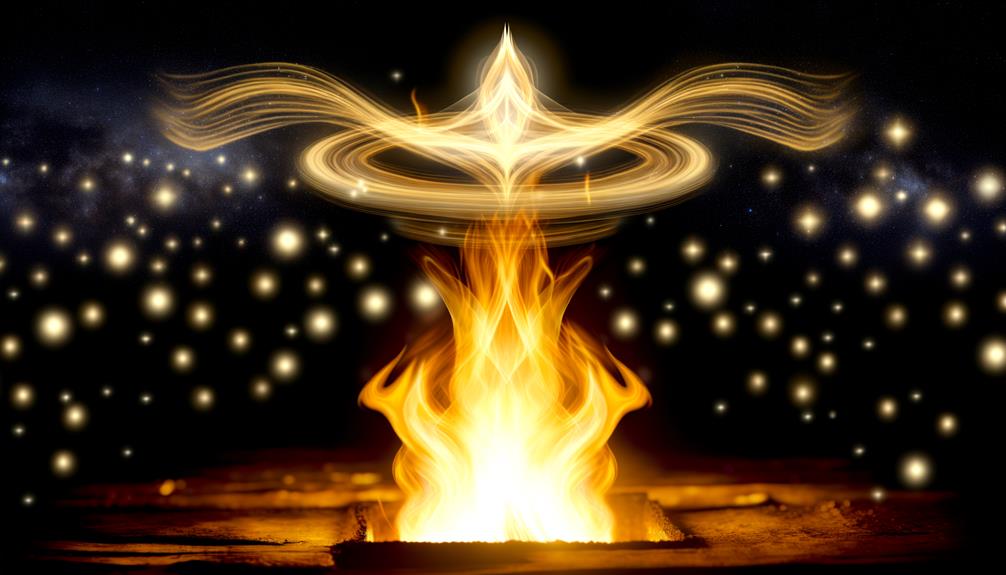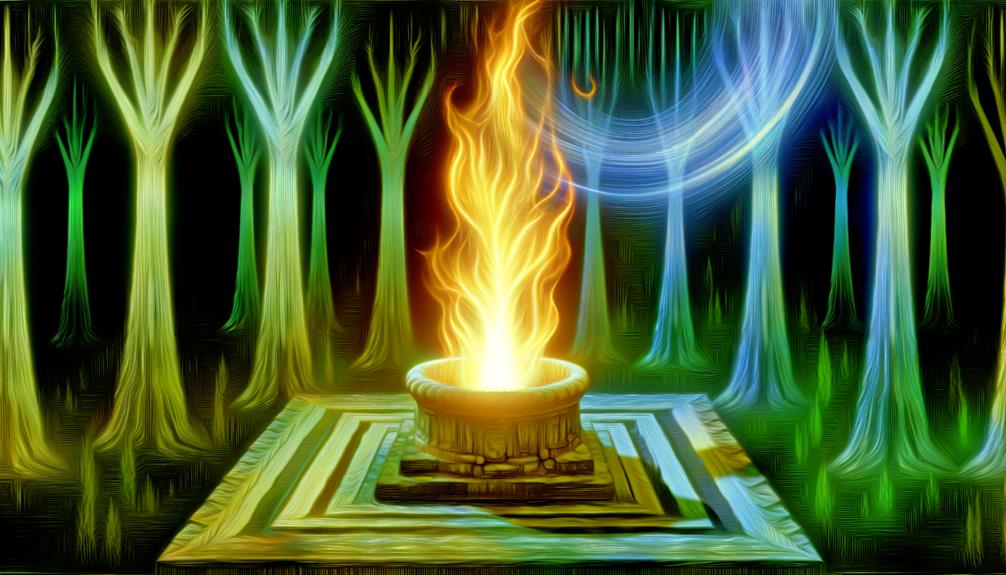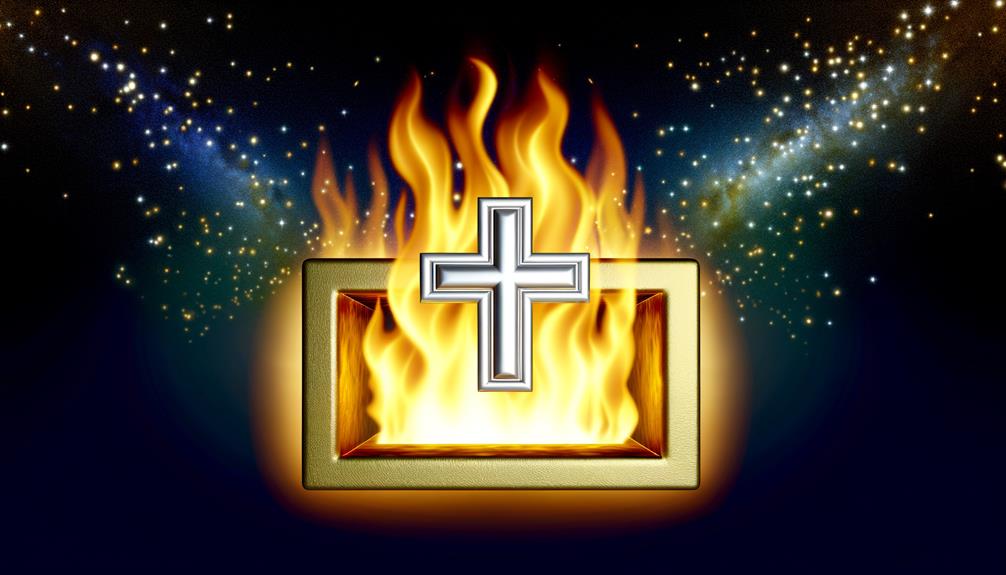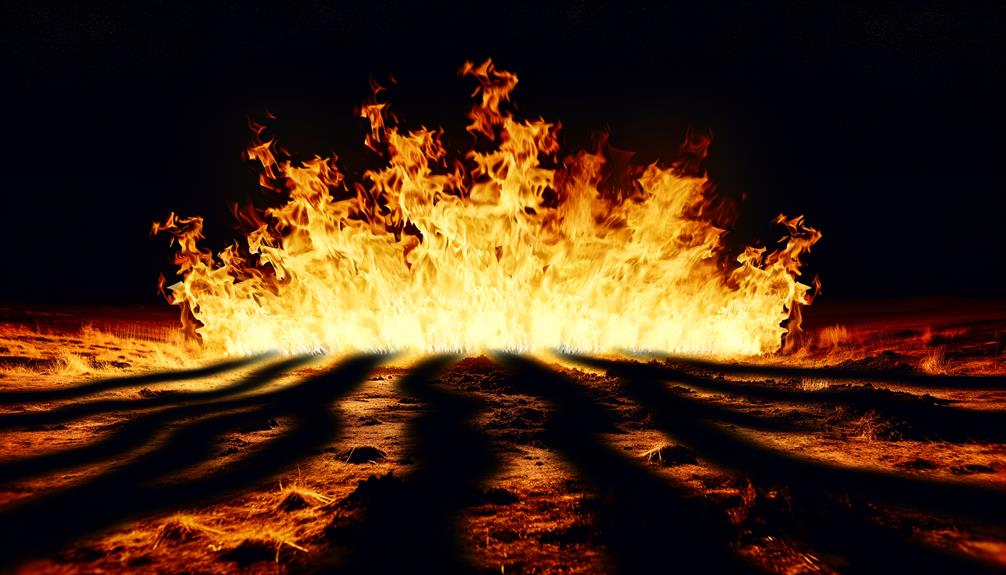Symbolic Meaning of Fire in the Bible: Purification
In the Bible, fire symbolizes divine presence, purification, judgment, passion, transformation, and covenant. It appears in instances like the burning bush and Mount Sinai, signifying God’s holiness and guidance.
Fire also denotes purification, likened to refining metals, and spiritual trials. In addition, it represents God’s judgment, as seen in the destruction of Sodom and Gomorrah, and the imagery of hellfire.
Passion and zeal for God are portrayed through fire metaphors, illustrating fervent devotion. Finally, fire embodies covenantal commitment and sacrificial sanctification.
Exploring these themes offers a deeper understanding of fire’s multifaceted symbolism in biblical texts.

Biblical Meaning of Fire: God’s Presence, Purification, Judgment, and the Holy Spirit
| Interpretation | Meaning | Explanation |
|---|---|---|
| God’s Presence | Fire often symbolizes God’s powerful and consuming presence. | In Exodus 3:2, God appeared to Moses in the burning bush, representing His holy presence. Similarly, God led the Israelites with a pillar of fire at night (Exodus 13:21). |
| Purification and Refinement | Represents spiritual purification and refinement through trials. | Fire is used to purify and refine metals, symbolizing how God refines His people through challenges, as in Zechariah 13:9: “I will refine them like silver and test them like gold.” |
| Judgment and Destruction | Fire symbolizes God’s righteous judgment and wrath against sin. | Fire is often associated with God’s judgment, as seen in Sodom and Gomorrah being destroyed by fire from heaven (Genesis 19:24), and in Revelation 20:14-15, where fire represents the final judgment. |
| Holy Spirit and Empowerment | Symbolizes the Holy Spirit’s power and presence. | In Acts 2:3, the Holy Spirit appeared as tongues of fire at Pentecost, symbolizing the empowerment of believers and the presence of God within them. |
| Divine Testing | Fire represents the testing of faith and endurance. | In 1 Peter 1:7, faith is compared to gold tested by fire, emphasizing how trials reveal the genuineness of one’s faith and purify the believer. |
Divine Presence

In the context of biblical literature, fire frequently symbolizes the divine presence, serving as a tangible manifestation of God’s power and holiness.
For instance, the burning bush encountered by Moses (Exodus 3:2-4) signifies God’s immediate and unmediated communication with humanity.
Similarly, the pillar of fire guiding the Israelites by night (Exodus 13:21) illustrates divine guidance and protection.
Fire’s association with theophany underscores its role in making the abstract concept of divinity perceptible to human senses.
The transfiguration of Jesus (Matthew 17:2), where His face shone like the sun, further cements fire’s symbolic representation of divine glory.
These instances collectively reinforce fire as an emblem of God’s omnipotent and sanctified nature within biblical narratives.
Purification and Refinement

The motif of fire in the Bible is frequently associated with the concept of purification and refinement, symbolizing not only the cleansing of sin but also the transformative trials believers undergo.
This process of spiritual growth is likened to the refining of precious metals, where fire removes impurities, thereby enhancing the intrinsic value of the individual.
Such biblical references underscore the integral role of fire as an agent of divine refinement and moral fortitude.
Cleansing Through Trials
How does the imagery of fire in the Bible serve as a profound symbol for the process of purification and refinement through life’s trials?
Biblically, fire often represents an agent of cleansing, transforming a believer’s character through adversity. Verses like Isaiah 48:10 illuminate this, stating, ‘I have refined you, but not as silver; I have tested you in the furnace of affliction.’
This metaphorical furnace underscores divine intent to purify souls, stripping away impurities and fostering spiritual resilience. Contextually, fire’s purifying nature is not punitive but redemptive, aimed at removing moral flaws and nurturing holiness.
Consequently, fire in scriptural context symbolizes an essential, albeit challenging, process of sanctification, reflecting God’s desire for a refined and purified faith.
Spiritual Growth Process
Biblical depictions of fire as a symbol of purification and refinement illustrate a nuanced process of spiritual growth, where believers undergo transformative trials to achieve greater holiness. This metaphor underscores the intricate journey of sanctification, wherein individuals are purged of impurities and emerge spiritually fortified.
Scriptural references to this process reveal three key aspects:
- Character Formation: Fire represents the trials that shape and strengthen the believer’s character, as seen in passages like 1 Peter 1:7.
- Divine Presence: God’s purifying presence, akin to a refiner’s fire, is depicted in Malachi 3:2-3, emphasizing His role in spiritual cleansing.
- Moral Purity: Fire symbolizes the eradication of sin and moral corruption, aligning with Isaiah 6:6-7, where a burning coal purifies the prophet’s lips.
Guidance and Protection

In the biblical narrative, fire functions as a vital symbol of divine presence, guiding and protecting the Israelites during their exodus from Egypt.
This is epitomized by the pillar of fire that led them by night, signifying God’s omnipresent guidance and safeguarding.
Such instances underscore fire’s dual role as an emblem of both divine illumination and protective oversight.
Divine Presence Manifestation
Throughout the Bible, fire frequently symbolizes God’s divine presence, serving both as a beacon of guidance and a source of protection for His followers. This multifaceted symbol is rich in meaning and can be seen in various contexts:
- Theophany: In Exodus, God appears to Moses as a burning bush, signaling His presence and divine mission.
- Covenantal Assurance: In Genesis, a flaming torch signifies God’s covenant with Abraham, demonstrating His unwavering commitment.
- Purification and Holiness: Isaiah’s vision in which a seraphim uses a burning coal to purify his lips underscores fire’s role in sanctification.
These instances collectively highlight fire as an enduring emblem of divine interaction, guiding and safeguarding the faithful within biblical narratives.
Leading the Israelites
The symbolism of fire further extends to the narrative of the Israelites’ exodus, where it signifies God’s guidance and protection through the pillar of fire by night.
This divine manifestation served a dual purpose: providing light and direction during their nocturnal travels and acting as a protective barrier against potential threats.
The pillar of fire illustrated a tangible representation of God’s omnipresence and unfaltering commitment to His covenant with the Israelites.
Contextually, this phenomenon underscores the theological theme of divine leadership and guardianship in uncertain and perilous conditions.
The continuous presence of fire as a guiding force not only reassured the Israelites of God’s sovereignty but also reinforced their reliance on His providential care in their journey towards the Promised Land.
God’s Judgment

Fire frequently serves as a potent symbol of God’s judgment in biblical narratives, highlighting divine retribution and purification. This imagery underscores the seriousness of divine justice and the transformative power of God’s will. Biblical texts often associate fire with episodes where God’s judgment is rendered unequivocally clear.
- Sodom and Gomorrah: In Genesis 19:24-25, fire and brimstone rain down upon these cities as a manifestation of divine judgment for their sins.
- Mount Sinai: Exodus 19:18 describes the mountain covered in smoke because the Lord descended upon it in fire, symbolizing the law’s sanctity and the divine presence.
- Lake of Fire: Revelation 20:14-15 depicts the ultimate judgment, where the wicked are cast into a lake of fire, signifying eternal punishment.
These examples illustrate fire’s dual role in both destruction and purification in the context of divine judgment.
Holy Spirit at Pentecost

In contrast to fire’s role in divine judgment, the Holy Spirit at Pentecost embodies fire as a symbol of empowerment and divine presence, reflecting a transformative moment in the early Christian community.
Acts 2:3-4 describes tongues of fire resting on the apostles, signifying the Holy Spirit’s arrival. This fire symbolizes purification, enlightenment, and the inauguration of a new covenantal relationship between God and humanity.
The event marks a pivotal shift from fear of divine retribution to experiencing God’s immanence and guidance. The imagery of fire underscores the dynamic and active nature of the Holy Spirit, catalyzing the apostles to preach boldly, thereby expanding the early Church and reinforcing the transformative power of divine intervention.
Covenant and Sacrifice

Within the biblical narrative, fire serves as a profound symbol in the context of covenant and sacrifice, often representing God’s presence and the sanctification of the sacrificial act. This symbolism is evident in several key instances:
- Abraham’s Covenant: In Genesis 15, a smoking firepot and a blazing torch symbolize God’s presence as He makes a covenant with Abraham, signifying divine commitment.
- Mosaic Covenant: On Mount Sinai, fire envelops the mountain, indicating God’s holiness and the establishment of the Law, as described in Exodus 19.
- Sacrificial Offerings: Fire consuming offerings on the altar, as in Leviticus, signifies the acceptance of sacrifices by God, reflecting purification and divine approval.
These instances underscore fire’s role in manifesting divine interaction and covenantal fidelity.
Conclusion
In the biblical narrative, fire symbolizes divine presence, purification, guidance, judgment, the Holy Spirit, and covenantal sacrifice. These multifaceted roles underscore fire’s theological and symbolic significance across various scriptural contexts. Across the Old Testament, the burning bush that Moses encountered on Mount Sinai represented the holy fire symbolism of God’s presence and guidance. In the New Testament, the fiery tongues that descended upon the apostles at Pentecost symbolized the Holy Spirit’s empowering presence. The recurring motif of holy fire symbolism in the Bible reflects the depth of its theological and symbolic importance in the religious tradition.
Like a multifaceted diamond, fire’s symbolism is complex and multifarious, reflecting the divine’s dynamic relationship with humanity. This understanding enriches contemporary interpretations of biblical texts, much like how understanding historical contexts can enhance one’s appreciation of Shakespearean plays.
Consequently, fire remains a poignant symbol within biblical literature.






